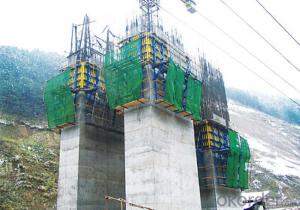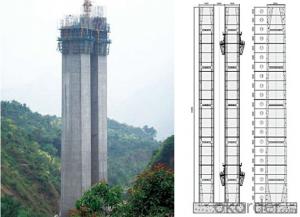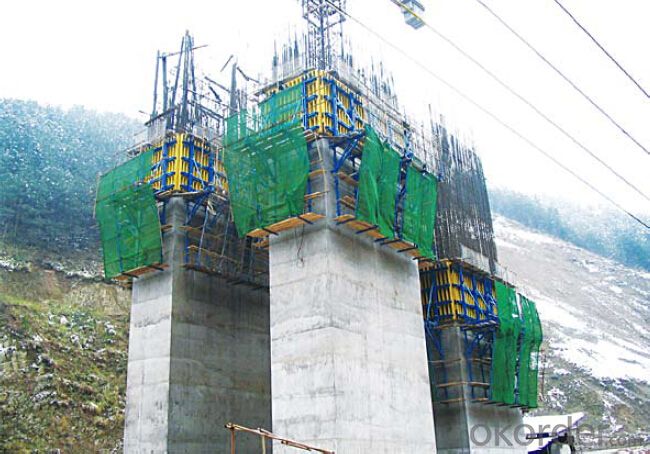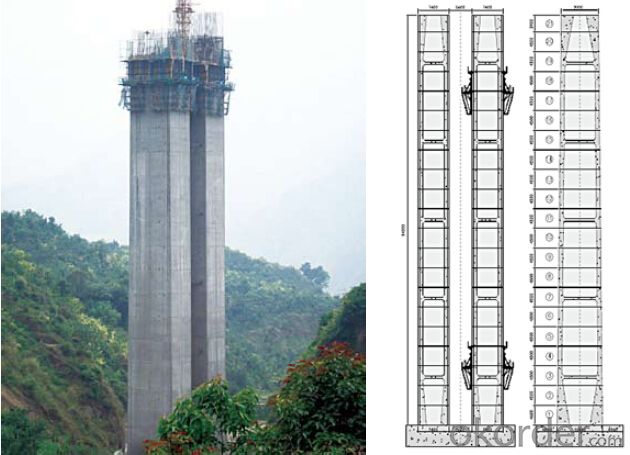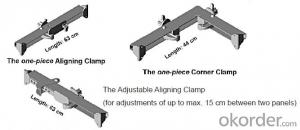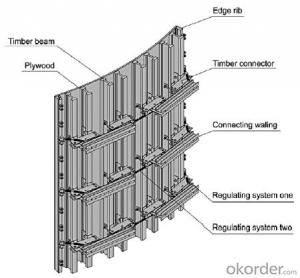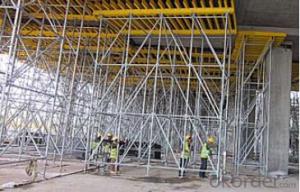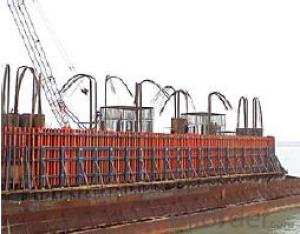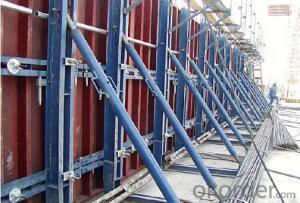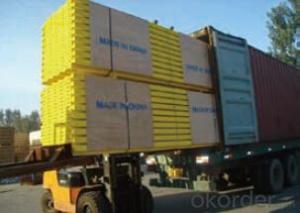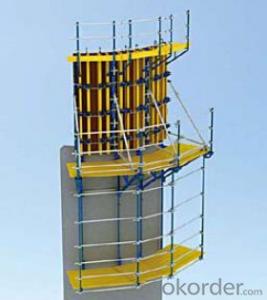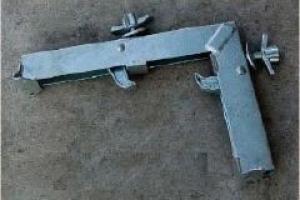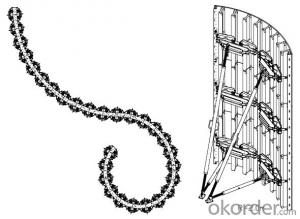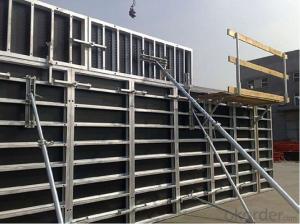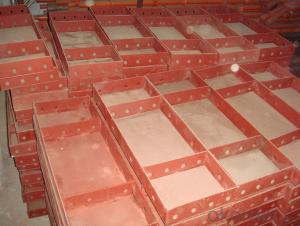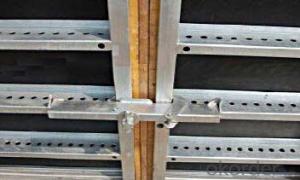Climbing Bracket CB240 for formwork and scaffolding system
- Loading Port:
- Tianjin
- Payment Terms:
- TT OR LC
- Min Order Qty:
- 50 m²
- Supply Capability:
- 1000 m²/month
OKorder Service Pledge
OKorder Financial Service
You Might Also Like
Climbing Bracket CB240 & CB210
They are framework brackets for supporting large-area wall formwork.
Typical applications for the CB240&CB210 are pier and column/shear wall/core walll/ in the
building.
CB210 has smaller size than CB240, it will be cost effective in some condition.
Characteristics:
◆ High bearing capacity
The high loading capacity of the brackets allow very large scaffold units. This saves the number
anchor points required as well as reducing climbing times.
◆ Simple moving procedure by crane
Through the strong connection of formwork together with the climbing scaffold, both can be moved
as a single climbing unit by crane. Thus valuable time-savings can be achieved.
◆ Fast striking process without a crane
With the retrusive set, large formwork elements can also be retracted quickly and a minimum of
effort.
◆ Safe with work platform
The platforms have assembled firmly with bracket and will be climbing together, without scaffolding
but can work safely in spite of your high location.
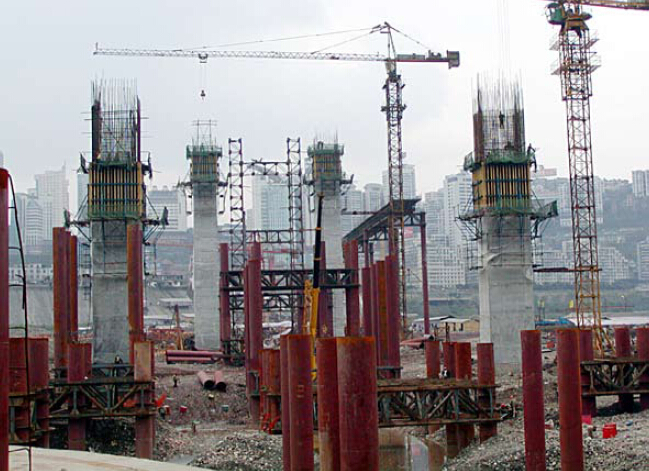
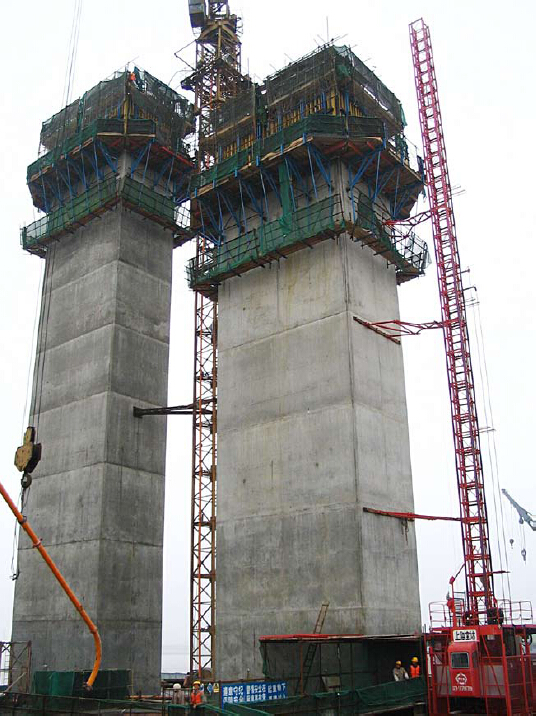
- Q: How does steel formwork handle different concrete crack control measures?
- Steel formwork offers versatility and durability when it comes to dealing with various concrete crack control measures. One of its main benefits lies in its ability to provide a sturdy structure that effectively withstands the forces exerted during concrete pouring and curing. This rigidity plays a vital role in reducing the occurrence of cracks in the concrete. When considering crack control measures, steel formwork brings several advantages. Firstly, its smooth surface allows for easy placement and compaction of the concrete, minimizing the chances of voids and air pockets that can lead to cracking. Furthermore, steel formwork can be specifically designed to accommodate different reinforcing measures, such as rebar and mesh, further enhancing crack control. Additionally, steel formwork allows for precise control over the curing process. Contractors can regulate the rate of concrete hydration by utilizing steel forms, which is crucial in crack control. Proper curing techniques, including the application of curing compounds or the implementation of thermal insulation, can be easily executed with steel formwork, guaranteeing optimal conditions for crack prevention. In terms of crack repair, steel formwork offers an advantage by providing easy access to the concrete surface. In the event of cracks, repairs can be conducted by directly injecting epoxy or other suitable materials into the affected areas. The rigidity of steel formwork ensures that the repaired sections maintain their structural integrity and prevent further cracking. Overall, steel formwork proves to be a dependable solution for managing various concrete crack control measures. Its rigidity, smooth surface, and compatibility with reinforcing measures make it highly efficient in minimizing cracks during the pouring, curing, and repair stages of concrete construction.
- Q: Can steel formwork be easily transported to different job sites?
- Indeed, steel formwork can effortlessly be transported to various worksites. Renowned for its sturdiness and robustness, steel formwork is ideal for repeated utilization and convenient transportation. It can be dismantled and reassembled without compromising its structural soundness, enabling effortless transportation to diverse destinations. Furthermore, unlike alternative formwork types, steel formwork is lightweight, rendering it more manageable to handle and transport using conventional construction machinery or vehicles. The adaptability and portability of steel formwork render it an esteemed preference for construction ventures necessitating frequent relocation between worksites.
- Q: Can steel formwork be used in areas with high wind uplift forces?
- Yes, steel formwork can be used in areas with high wind uplift forces. Steel is a strong and durable material that can withstand high wind forces, making it suitable for use in such areas. Additionally, the rigid and stable nature of steel formwork provides added strength and stability, ensuring the structure remains intact even under extreme wind conditions.
- Q: Can steel formwork be used for projects with limited formwork transportation options?
- Yes, steel formwork can be used for projects with limited formwork transportation options. Steel formwork is known for its durability, strength, and reusability, making it an ideal choice for projects that require transportation over long distances or difficult terrains. Unlike traditional wood formwork, steel formwork can withstand the rigors of transportation without getting damaged or deformed. Furthermore, steel formwork is lightweight compared to other materials used for formwork, such as concrete or timber, which makes it easier to transport even in areas with limited transportation options. The lightweight nature of steel formwork not only reduces transportation costs but also allows for easier handling and installation on-site. Additionally, steel formwork can be easily disassembled and reassembled, making it suitable for projects that require frequent formwork transportation. The modular design of steel formwork allows for easy transportation and reconfiguration, ensuring that the formwork can be efficiently transported to different project sites as needed. In conclusion, steel formwork is a versatile and practical solution for projects with limited formwork transportation options. Its durability, lightweight nature, and ease of disassembly and reassembly make it a suitable choice for projects that require formwork to be transported over long distances or difficult terrains.
- Q: Can steel formwork be used in curved or irregular structures?
- Yes, steel formwork can be used in curved or irregular structures. Its flexible nature allows it to be easily shaped and adjusted to fit the desired curves and angles of the structure. Additionally, steel formwork offers high strength and durability, making it suitable for various construction projects, including those with unconventional shapes.
- Q: How does steel formwork handle concrete temperature differentials?
- Steel formwork is a popular choice for concrete construction due to its durability and strength. When it comes to handling concrete temperature differentials, steel formwork offers several advantages. Firstly, steel has a high coefficient of thermal conductivity, meaning it can quickly absorb and distribute heat. This property allows steel formwork to efficiently dissipate the heat generated during the hydration process of concrete. As a result, steel formwork helps to minimize the risk of thermal cracking caused by temperature differentials. Furthermore, steel formwork is known for its dimensional stability. Unlike other materials like wood, steel does not expand or contract significantly with temperature changes. This stability ensures that the formwork maintains its shape and integrity, even when exposed to varying concrete temperatures. It helps to prevent any distortions, warping, or bulging that could affect the quality and appearance of the concrete structure. Additionally, steel formwork is resistant to fire and high temperatures, making it suitable for handling concrete that undergoes rapid temperature changes, such as in hot weather conditions or during the curing process. Its ability to withstand extreme temperatures without deforming or losing its structural integrity ensures that the formwork remains intact and provides the necessary support and containment for the concrete. In summary, steel formwork effectively handles concrete temperature differentials by efficiently dissipating heat, maintaining dimensional stability, and withstanding high temperatures. These properties contribute to the overall quality and durability of the concrete structure, while minimizing the risk of thermal cracking and other issues caused by temperature variations.
- Q: How does steel formwork affect the overall labor productivity in construction?
- Labor productivity in construction can be significantly influenced by steel formwork. The durability and strength of steel formwork allow it to withstand the pressures and forces exerted during the concrete pouring process, reducing the frequency of repairs or replacements. This minimizes downtime and increases overall labor productivity. In addition, steel formwork provides a high level of accuracy and precision in creating concrete structures, resulting in better quality finishes and fewer rework or corrections. This saves time and effort for construction workers and enhances the efficiency of the construction process by achieving consistent dimensions and smooth surfaces. Moreover, the ease of assembly and dismantling of steel formwork is well-known. The modular nature of steel formwork systems allows for quick and efficient setup, reducing the time spent on formwork erection. Similarly, the ease of dismantling enables faster turnaround times between construction phases, allowing workers to move on to the next task more swiftly. Furthermore, steel formwork systems often include adjustable props, clamps, and connectors, making them highly adaptable to various construction requirements. This versatility enables workers to quickly adjust and modify the formwork to accommodate changes in design or construction plans, eliminating delays and improving labor productivity. Lastly, steel formwork contributes to a safer working environment. The robustness and stability of steel formwork systems offer enhanced protection for construction workers, reducing the risk of accidents and injuries. By ensuring worker safety, steel formwork promotes a more efficient and productive construction process. In summary, steel formwork has a positive impact on labor productivity in construction due to its durability, accuracy, ease of assembly and dismantling, adaptability, and improved safety. These factors contribute to a more efficient construction process, reducing downtime, rework, and the overall time required for project completion.
- Q: Can steel formwork be used in areas with high seismic vulnerability?
- Certainly! Steel formwork is capable of being utilized in regions with a notable susceptibility to seismic activity. Due to its remarkable strength and durability, steel formwork is well-suited for enduring seismic forces. This inflexible system is capable of withstanding both horizontal loads and vibrations induced by earthquakes. Furthermore, steel formwork can be readily reinforced to heighten its resistance to seismic activity. Nevertheless, it is vital to ensure that proper engineering and design considerations are taken into account in order to effectively anchor and brace the formwork system, allowing it to withstand the specific seismic conditions of the area. In summary, steel formwork presents itself as a feasible choice for construction in regions with high seismic vulnerability; however, it is imperative to exercise appropriate precautions and implement design modifications to guarantee its efficacy.
- Q: How does steel formwork handle different concrete water-cement ratio specifications?
- Steel formwork is a popular choice when it comes to handling different concrete water-cement ratio specifications due to its inherent strength and durability. Steel formwork systems are designed to withstand the pressure exerted by wet concrete during the pouring and curing process, regardless of the water-cement ratio. The water-cement ratio in concrete refers to the amount of water used relative to the amount of cement. It plays a crucial role in determining the strength, workability, and durability of the concrete. Different water-cement ratio specifications are often required for various construction projects, depending on factors such as the desired concrete strength and the environmental conditions. Steel formwork provides a robust and rigid framework that can effectively contain different concrete mixtures, regardless of the water-cement ratio. The steel panels and frames are designed to securely hold the wet concrete in place, preventing any leakage or deformation during the casting and curing process. This ensures that the concrete retains its desired shape and strength. Moreover, steel formwork offers the advantage of being reusable, which is especially beneficial when dealing with different water-cement ratio specifications. After the concrete has set and cured, the steel formwork can be easily dismantled, cleaned, and reassembled for use in the next project. This not only saves cost and time but also allows for flexibility in adapting to varying water-cement ratio requirements. Additionally, steel formwork systems can be easily adjusted and customized to accommodate specific project needs. This includes modifying the formwork to achieve the desired concrete surface finish and shape. The versatility of steel formwork allows contractors to work with different water-cement ratio specifications without compromising on the quality and integrity of the final concrete structure. In conclusion, steel formwork is an excellent choice for handling different concrete water-cement ratio specifications. Its strength, durability, and adaptability make it a reliable solution for containing wet concrete, ensuring that the desired water-cement ratio is maintained throughout the construction process.
- Q: Can steel formwork be used in seismic zones?
- Yes, steel formwork can be used in seismic zones. Steel is a strong and durable material that can withstand the forces exerted during an earthquake. It has the ability to flex and absorb energy, making it suitable for use in seismic zones. Additionally, steel formwork provides stability and rigidity to the structure, ensuring that it can withstand the shaking and movement caused by seismic activity. However, it is important to consider other factors such as design, construction techniques, and local building codes to ensure that the steel formwork system is properly installed and meets the specific requirements of the seismic zone.
Send your message to us
Climbing Bracket CB240 for formwork and scaffolding system
- Loading Port:
- Tianjin
- Payment Terms:
- TT OR LC
- Min Order Qty:
- 50 m²
- Supply Capability:
- 1000 m²/month
OKorder Service Pledge
OKorder Financial Service
Similar products
Hot products
Hot Searches
